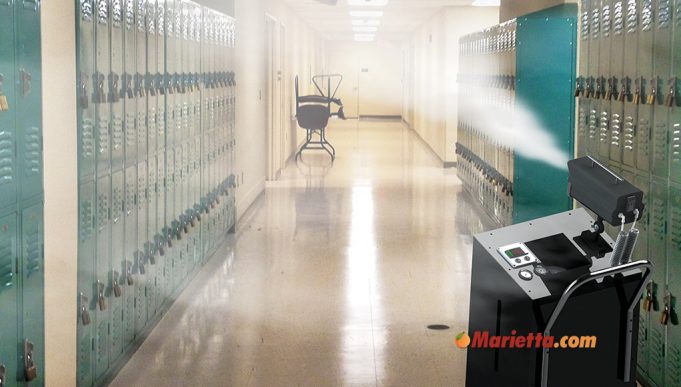Some school districts and other organizations are breathing a little easier thanks to equipment manufactured by Marietta’s Aguair.
Last year, Marietta-based Aguair, a manufacturer of engineered systems for agribusiness and other markets, was doing business as usual. Aguair’s ClensAir™, SaniCart™, Aquatronics™, and other products are used widely to extend the life of perishables from farm-to-fork, through factors such as air sanitization, humidity control, aeroponics, water treatment and biosecurity in greenhouses, storage facilities, processing centers, transportation and retail store backrooms. Aguair and its parent company, Prodew Inc., have been operating successfully in Georgia for a combined 25 years. Then the COVID-19 pandemic hit.
But this isn’t a tale of woe that so many industries and individuals have experienced in 2020. This is a tale of ingenuity, adaptability, and triumph. Aguair leadership saw an opportunity to help, a chance to assist with re-openings, including helping schools conduct in-person learning while keeping their students safe.
With its equipment already in use across the food industry, Aguair knew that it could help shuttered businesses and schools to reopen with a broad sense of security and assurance by disinfecting indoor environments and limiting the spread of pathogens.
“What we realized is that there is a growing need for this kind of equipment in public spaces and for public safety, for public health,” said Nadya Merchant, Ph.D., Aguair scientific director. “Aguair has seen a huge increase in demand for its equipment over the last few months, as people have started to try to get back to normal. You have dentist offices, veterinarians, you’ve got schools, hotels, fitness centers, restaurants, everyone scrambling to make their facilities safe.”
All of these industries and companies were calling for information regarding two Aguair products that are effective at fighting the spread of pathogens, the company reports — the mobile SaniCart and the ClensAir. While interest has been shown from customers from across the United States, Aguair has gotten particular traction in the State of Nevada.
Word began to spread last spring following reports out of Nevada of the successful use of SaniCart to help the Boys & Girls Clubs there to reopen following closure due to the pandemic. Executives there conducted extensive research to ensure safety, removing shared equipment such as computers and game tables. They also wanted to find an effective and efficient way to sanitize the facility for staff members and the hundreds of children they serve every day. When leadership there found Aguair, they knew they had located the right solution.
Mike Wurm, executive director of the Boys and Girls Club at Truckee Meadows in Reno, Nevada said that through the pandemic, their staff has reevaluated and improved their disinfection protocols. The thorough sanitization procedures put a big demand on staff, who at the beginning of the pandemic were spending hours wiping down surfaces. “SaniCart is great because it allows for more thorough disinfection without too much manpower.” His staff is using the equipment in close to 20 Boys and Girls Clubs through Reno and elsewhere in northern Nevada.
“SaniCart has been really good in our daycares,” Wurm said. His staff would completely bleach down all surfaces in the daycare centers every two hours. “With SaniCart, you roll in the machine and completely sanitize everything in the room in just 20 minutes. You don’t have to wipe down each toy or each block, because of the science behind the fogging machine that gets the disinfectant on every surface.”
In the computer labs, Wurm said, “We are no longer worried about electronics getting wet. We can sanitize keyboards and mics.” The Boys and Girls Cub centers purchased SaniCart with CARES Act funding and are using it throughout their buildings and even on their buses.
“SaniCart makes good sense, especially in our larger buildings,” Wurm said. “It goes a long way in replacing manpower. When kids leave an area, we roll in the machine, plug it in, turn it on, close the door, and the room is completely sanitized by the time the kids return. Before, we had a whole layer of staff disinfecting, now we just have one person working the SaniCart. It is efficient and also more thorough at disinfecting.”
When local community leaders heard about the successes at the Boys & Girls Clubs, a Nevada foundation stepped in to help many schools in rural northern Nevada that couldn’t afford such equipment on their own. This particular foundation assists northern Nevada communities with healthcare, education, medical research, and community service funding; and over the past few decades has funded millions in grants to northern Nevada non-profits and schools.
The foundation has provided grants to six school districts, two charter schools, and other Nevada non-profits to purchase sanitization solutions, including Aguair systems. Additionally, the foundation worked with Aguair to obtain deep discounts on SaniCart and ClensAir for the school districts that received foundation grants. The foundation wanted to make sure that as schools reopened, they were adding additional layers of protection to keep students and teachers safe. All of the school districts opted to purchase SaniCart — one unit per school building, and about 90 percent of the school districts also purchased ClensAir for their nurses’ offices and COVID-19 isolation rooms.
Harman Bains, director of business services at Lyon County School District near Reno was looking for efficient and convenient disinfecting solutions so that his staff could get away from manually disinfecting surfaces with a rag and spray bottle at the 18 schools in his district. When he heard of SaniCart as a sanitization solution that could be rolled around and put in a classroom, he was thrilled. His district has received funding from the local foundation to purchase SaniCart and ClensAir.
Bains said, “The convenience aspect of SaniCart is huge. We initially looked at electrostatic backpack sprayers, but the idea of carrying around 20-pound backpacks all day long was a hinderance.” Bains also likes the fact that the SaniCart disinfectant tank has a larger capacity, so it doesn’t need to be refilled as frequently, and that unlike with other sprayers, his staff doesn’t need to wipe down surfaces after using SaniCart. The dry micro-fog leaves no wetness behind.
The school district is using ClensAir air purifiers in each of their nurse’s offices. “We placed ClensAir on top of the doors to keep the air clean as kids who might not be feeling well come in and out of the nurse’s offices.”
Harman thanks the local foundation for funding this disinfection equipment that will “not only help fight this pandemic in our schools today, but will continue to make a positive impact on our students’ lives for years and even decades to come.”
The foundation hopes to inspire other organizations and school districts around the country to invest in technologies that help reduce airborne and surface transmission of pathogens and reduce missed school days among students.
Other organizations and businesses in Nevada including a community college, an arts and cultural center, and a museum have also invested in Aguair technology.
SaniCart is a wheeled unit that can be used with several disinfecting agents to deliver air and surface sanitization. The SaniCart emits a dry fog of disinfectant that leaves no moisture behind. “This spray basically covers the entire room, cleaning surfaces, and disinfecting the air. You have disinfectant settling on all the surfaces, underneath, behind, and in between. Nothing is left untouched,” Dr. Merchant said.
ClensAir is an air purifying system that uses a six-stage air sanitization process, including technology that was developed for NASA. The unit consisting of particulate and antimicrobial filters, UV and photocatalytic lamps, an odor control filter, and a surface decontaminant. Independent lab tests have shown ClensAir to be over 99.9-percent effective in removing viruses and bacteria.
All of this from a small, rectangular container about 42 inches long (and weighing 15-20 pounds) that is easily wall-mounted or placed on a shelf and can be left to do its job until it requires a filter change. And the ClensAir has built-in filter monitors to remind users when those items need to be changed — based on the environment in which they are placed.
Dr. Merchant says that combining SaniCart and ClensAir creates a complete sanitization package for businesses like restaurants, hotels, airlines, and medical offices, as well as churches. Other areas where Aguair products are now being used and installed include office buildings, co-working spaces, and other commercial properties. The company has steadily increased production to meet this growing demand. “We have hired many more people; we are trying to work as fast as we can,” she said. “And remember,” she added, “this pandemic won’t last forever, but there always will be the annual flu, and other viruses — such as the common cold — to deal with on a regular basis. Looking at it that way, commercial sanitization equipment is well worth the investment.”
Locally, schools still are working out how such equipment might fit into their budgets, or where they could find funding, but there are spaces in metro-Atlanta that have installed Aguair equipment for patrons, including the Marcus Jewish Community Center of Atlanta and the City of Refuge Innovation Hub.
“We are humbled to collaborate with this foundation, who chooses to remain anonymous, and the Boys & Girls Clubs in Nevada, to help safeguard children in rural Nevadan communities. Aguair, and its parent company, Prodew, are also indebted to the City of Marietta and to Cobb County for supporting our growth over the last two decades,” Dr. Merchant said. “It is with this local backing that Aguair has been able to research and develop world-class sanitization equipment such as SaniCart and ClensAir.”

















